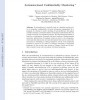Free Online Productivity Tools
i2Speak
i2Symbol
i2OCR
iTex2Img
iWeb2Print
iWeb2Shot
i2Type
iPdf2Split
iPdf2Merge
i2Bopomofo
i2Arabic
i2Style
i2Image
i2PDF
iLatex2Rtf
Sci2ools
120
Voted
ASIAN
2006
Springer
2006
Springer
Automata-Based Confidentiality Monitoring
Abstract Non-interference is typically used as a baseline security policy to formalize confidentiality of secret information manipulated by a program. In contrast to static checking of non-interference, this paper considers dynamic, automaton-based, monitoring of information flow for a single execution of a sequential program. The monitoring mechanism is based on a combination of dynamic and static analyses. During program n, abstractions of program events are sent to the automaton, es the abstractions to track information flows and to control the execution by forbidding or editing dangerous actions. The mechanism proposed is proved to be sound, to preserve executions of well-typed programs (in the security type system of Volpano, Smith and Irvine), and to preserve some safe executions of ill-typed programs.
Related Content
| Added | 20 Aug 2010 |
| Updated | 20 Aug 2010 |
| Type | Conference |
| Year | 2006 |
| Where | ASIAN |
| Authors | Gurvan Le Guernic, Anindya Banerjee, Thomas P. Jensen, David A. Schmidt |
Comments (0)

